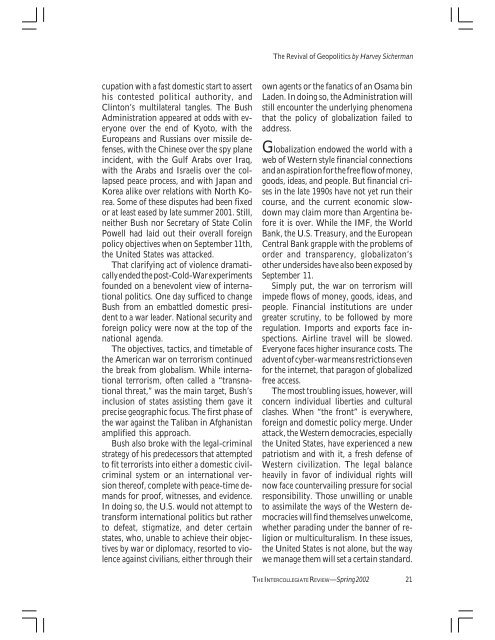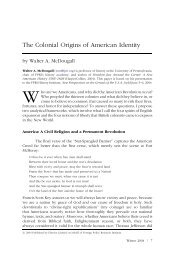The Revival of Geopolitics - Foreign Policy Research Institute
The Revival of Geopolitics - Foreign Policy Research Institute
The Revival of Geopolitics - Foreign Policy Research Institute
You also want an ePaper? Increase the reach of your titles
YUMPU automatically turns print PDFs into web optimized ePapers that Google loves.
cupation with a fast domestic start to assert<br />
his contested political authority, and<br />
Clinton’s multilateral tangles. <strong>The</strong> Bush<br />
Administration appeared at odds with everyone<br />
over the end <strong>of</strong> Kyoto, with the<br />
Europeans and Russians over missile defenses,<br />
with the Chinese over the spy plane<br />
incident, with the Gulf Arabs over Iraq,<br />
with the Arabs and Israelis over the collapsed<br />
peace process, and with Japan and<br />
Korea alike over relations with North Korea.<br />
Some <strong>of</strong> these disputes had been fixed<br />
or at least eased by late summer 2001. Still,<br />
neither Bush nor Secretary <strong>of</strong> State Colin<br />
Powell had laid out their overall foreign<br />
policy objectives when on September 11th,<br />
the United States was attacked.<br />
That clarifying act <strong>of</strong> violence dramatically<br />
ended the post-Cold-War experiments<br />
founded on a benevolent view <strong>of</strong> international<br />
politics. One day sufficed to change<br />
Bush from an embattled domestic president<br />
to a war leader. National security and<br />
foreign policy were now at the top <strong>of</strong> the<br />
national agenda.<br />
<strong>The</strong> objectives, tactics, and timetable <strong>of</strong><br />
the American war on terrorism continued<br />
the break from globalism. While international<br />
terrorism, <strong>of</strong>ten called a “transnational<br />
threat,” was the main target, Bush’s<br />
inclusion <strong>of</strong> states assisting them gave it<br />
precise geographic focus. <strong>The</strong> first phase <strong>of</strong><br />
the war against the Taliban in Afghanistan<br />
amplified this approach.<br />
Bush also broke with the legal-criminal<br />
strategy <strong>of</strong> his predecessors that attempted<br />
to fit terrorists into either a domestic civilcriminal<br />
system or an international version<br />
there<strong>of</strong>, complete with peace-time demands<br />
for pro<strong>of</strong>, witnesses, and evidence.<br />
In doing so, the U.S. would not attempt to<br />
transform international politics but rather<br />
to defeat, stigmatize, and deter certain<br />
states, who, unable to achieve their objectives<br />
by war or diplomacy, resorted to violence<br />
against civilians, either through their<br />
<strong>The</strong> <strong>Revival</strong> <strong>of</strong> <strong>Geopolitics</strong> by Harvey Sicherman<br />
own agents or the fanatics <strong>of</strong> an Osama bin<br />
Laden. In doing so, the Administration will<br />
still encounter the underlying phenomena<br />
that the policy <strong>of</strong> globalization failed to<br />
address.<br />
Globalization endowed the world with a<br />
web <strong>of</strong> Western style financial connections<br />
and an aspiration for the free flow <strong>of</strong> money,<br />
goods, ideas, and people. But financial crises<br />
in the late 1990s have not yet run their<br />
course, and the current economic slowdown<br />
may claim more than Argentina before<br />
it is over. While the IMF, the World<br />
Bank, the U.S. Treasury, and the European<br />
Central Bank grapple with the problems <strong>of</strong><br />
order and transparency, globalizaton’s<br />
other undersides have also been exposed by<br />
September 11.<br />
Simply put, the war on terrorism will<br />
impede flows <strong>of</strong> money, goods, ideas, and<br />
people. Financial institutions are under<br />
greater scrutiny, to be followed by more<br />
regulation. Imports and exports face inspections.<br />
Airline travel will be slowed.<br />
Everyone faces higher insurance costs. <strong>The</strong><br />
advent <strong>of</strong> cyber-war means restrictions even<br />
for the internet, that paragon <strong>of</strong> globalized<br />
free access.<br />
<strong>The</strong> most troubling issues, however, will<br />
concern individual liberties and cultural<br />
clashes. When “the front” is everywhere,<br />
foreign and domestic policy merge. Under<br />
attack, the Western democracies, especially<br />
the United States, have experienced a new<br />
patriotism and with it, a fresh defense <strong>of</strong><br />
Western civilization. <strong>The</strong> legal balance<br />
heavily in favor <strong>of</strong> individual rights will<br />
now face countervailing pressure for social<br />
responsibility. Those unwilling or unable<br />
to assimilate the ways <strong>of</strong> the Western democracies<br />
will find themselves unwelcome,<br />
whether parading under the banner <strong>of</strong> religion<br />
or multiculturalism. In these issues,<br />
the United States is not alone, but the way<br />
we manage them will set a certain standard.<br />
THE INTERCOLLEGIATE REVIEW—Spring 2002 21



